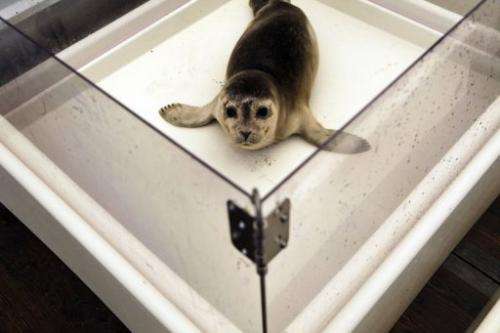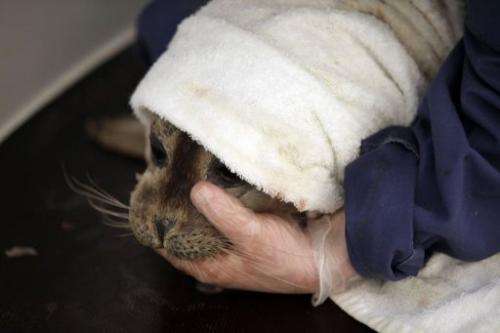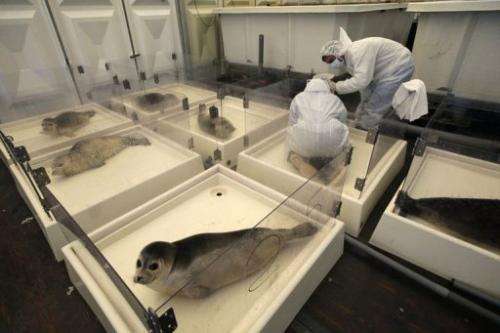Stranded baby seals concern Dutch rescuers

A month ago, a young seal named Marco washed up on a beach on the northern Dutch Frisian island of Ameland, one of a growing number of recently stranded pups that has left his rescuers worried.
Cold, hungry and riddled with parasites, Marco was taken to the Zeehondencreche (seal nursery), the country's oldest and largest seal rehabilitation centre on the Dutch north coast.
Marco's arrival spelled an avalanche of new infants and since New Year, seal numbers at the centre have more than more than doubled.
"There has been dramatic increase in numbers as a result of the recent winter storms in the Wadden Sea," Karst van der Meulen, who runs the marine mammal rehabilitation centre with his wife Lenie t'Hart, told AFP.
Over the first two weeks of 2012, more than 100 young common and grey seal pups were picked up, swelling ranks to a record of 351 infant mammals at the creche in Pieterburen, some 200 kilometres (120 miles) northeast of Amsterdam.
On average the centre, which depends on donations, received about 150 pups a year, picked up mainly from beaches along the Wadden Sea, but also elsewhere along the Dutch coastline.

Infants get separated from their mothers and are too weak to hunt themselves.
The huge jump prompted the Zeehondencreche to ring alarm bells, asking for extra volunteers in a massive operation involving feeding, cleaning and caring for the pups, many of whom like Marco, arrive in an extremely poor condition.
"When Marco arrived here, he weighed only 19.3 kilogrammes (42 pounds)," said Van der Meulen, just over half the weight for an eight-month-old seal.
"He was cold, hungry, dehydrated and riddled with lungworm, a parasite that infects infant seals and severely affects their breathing," he said.
Marco was washed, fed and put on antibiotics, first served in a "fish porridge" mix of ground herring and water and now disguised inside a herring, which he gets during his three to four daily feeds.
"Weighed on Tuesday, Marco's weight already picked up by at least a kilogramme," Van der Meulen said.
The recent surge in seal numbers prompted the Zeehondencreche, which has been rehabilitating the furry animals since late 1971, to add an extra tent with pens and pools to cope with the growing numbers.
Newly-arrived seals are housed in the visitors centre, where they are placed under quarantine and then moved to various tents and enclosures where their peculiar cries can be heard from special glass pens.
Larger and stronger seals live outside and laze in the winter sun next to specially-constructed swimming pools.

Volunteers and animal caregivers, like Monique Versloot, 41, who travelled up from Amsterdam zoo Artis to help around 40 full-time workers and 60 volunteers at the centre, who come from across the world.
"The one day, we had 17 new seals arrived and we were busy," French marine biology student Mano Chauveau, 23, told AFP laughing, while showing a scar on her index finger, a recent encounter with an angry pup.
But small seals washing up in the winter storm is just the symptom of a greater threat to around 5,000 seals populating in the Wadden Sea, a UNESCO World Heritage Site, said Van der Meulen.
"The reason why these pups wash up is because they are already in a weakened state, because their resistance have been broken down due to a lack of food and increased toxin levels in the water."
He said small-fish commercial overfishing has decimated seal food sources, while poisons like pesticides find their way to the Netherlands' largest rivers, like the Rhine and Maas and get dumped in the North Sea, where streams carry it into the tidal flats of the Wadden Sea.
But at least one seal pup seems to be happier in his new surroundings.
Sharing a pen with two other animals, a male named Chencho and Martijn, a female, Marco is doing well. He has been tagged and will be released back into the Wadden Sea within two to three months.
"When he got here, he didn't want to eat, he was listless," worker Lise Lotte, 26, told AFP, as she stuck a herring down a seal puppy's gullet.
"Look at him now. He's eating by himself and has become quite feisty, a good sign that he's getting better," she said.
(c) 2012 AFP



















